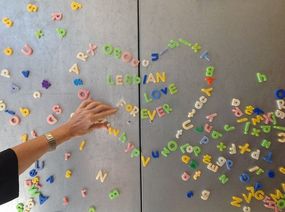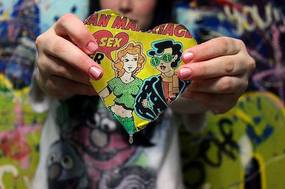
Daily Archives: December 30, 2014
Teen Suspect Found in Fatal Shooting of Transgender Woman
Teen Suspect Found in Fatal Shooting of Transgender Woman
Police are looking for two other suspects in connection to what they call a “robbery gone bad.”
Michelle Garcia
www.advocate.com/crime/2014/12/30/teen-suspect-found-fatal-shooting-transgender-woman
Gayer Times With the In-Laws… Next Year!
Gayer Times With the In-Laws… Next Year!
How did the holidays work out for you and your gay/lesbian lover, partner, spouse? How stressful was the time spent with the in-laws or with your own family? If you are among those who right now are busily trying to bury their holiday grudges, I have a question for you: WHY?
Why is it so tricky to be with your lover and her family? Why is it so hard to bring her home to yours? And why does this happen every single year sans fail?
Here are the main reasons:
1. In with the old, out with the new?
When we go home, we return to an old way– our family-way — of being. We slip back into the habits of communicating with our folks that we have known from childhood onward. Family awakens early memories and childhood patterns of talking, acting and feeling. We slip into the familiar glove of being a child in our family, automatically taking on its demands, entitlements, language and rules. Think of it as comfort food, making you feel warm and nostalgic– but it’s not really you.
2. Who is this stranger?
Our lover looks at us in this frame, this family setting, and doesn’t quite recognize us. Who is this person who suddenly behaves like an infant? Has tantrums? Suddenly can’t peep a word or utter an opinion? Who watches my every move with the suspicion that her mother won’t approve? Who suddenly forgets that I am there while she is the center of attention and the great entertainer for everyone? Who looks up to her dad who is a woman-hater and agrees with everything he says? Who is this person who allows my parenting skills to be called into question- aren’t we a team?
3. It really IS a two-way street.
This often goes both ways: both lovers don’t recognize the particular stress they are under – holiday performance stress – and resent that their performance isn’t up to snuff. We don’t easily acknowledge that most families don’t allow us to be “normal” the way we are in our private couples life. So we suddenly feel like strangers who stare at each other in dismay, wondering: Why can’t she be normal? Shouldn’t she have outgrown this by now? The truth of the matter is: we may never outgrow our family patterns and family stress. But we can help ourselves and each other to avoid the alienation, the grudges and fights that are so often the outcome of holiday visits.
4. Implement the 5 P’s: Proper Preparation Prevents Poor Performance
Here’s a trick that helped my with my lovers that you’re welcome to put into practice:
Before a family visit, we would agree to play out a “worst case scenario,” a fantasy game that would call up all the monsters we dreaded. One of us or both would narrate how the visit would go down as a nightmare. “They’ll once again serve the turkey I can’t eat even though they know damn well I am a vegetarian. I’ll be mad at you for not stepping up for me and just sitting there, looking sheepish. Your grandmother will insist I take at least 3 servings of her horrid Christmas pudding and I’ll be sick the rest of the day. Your sister, the high and mighty lawyer, will again needle me about the thesis I never manage to finish and you won’t defend me because you agree with her, in fact. Worst of all, they’ll have us sleep in the kid bedrooms, two separate rooms for God’s sake. Everyone will drink and I’ll have to pretend this is fun! But you’ll find it fun, no matter what, and that’ll get to me, so I won’t be able to stop myself from starting an argument because that’s at least honest.”
5. Strategize: Two heads are better than one.
There’s a good chance that the reality will seem less monstrous than the fantasy yarn we had spun beforehand. Everything may seem more bearable, even funny when our predictions came true by the letter. We’ve already established that we were together in this, confessing some of our true fears. We’ve worked out some understanding and next, some strategies to prevent the worst. Strategizing in a playful manner makes it much easier to maintain our sense of humor in the situation and provide support for each other.
In short, it’s a strategy game. With all the resolutions you’ll add to the list–how about placing a priority on easing holiday grudges and looking forward to more family cheer in the new year?
To learn more about being emotionally well-equipped for family visits year-round, check out Lesbian Marriage: A Love & Sex Forever Kit
Defense Secretary Includes Gay Sailor’s Proposal In Holiday Video For The Troops
Defense Secretary Includes Gay Sailor’s Proposal In Holiday Video For The Troops
 Defense Secretary Chuck Hagel and his wife Lilibet released a fairly ordinary holiday video message last week, except that amid the expected conventional nationalism was an image of MM2 2nd Class Jerrel Revels’ proposal to his boyfriend Dylan Kirchner.
Defense Secretary Chuck Hagel and his wife Lilibet released a fairly ordinary holiday video message last week, except that amid the expected conventional nationalism was an image of MM2 2nd Class Jerrel Revels’ proposal to his boyfriend Dylan Kirchner.
This is the first time a gay couple has been included in the Defense Secretary’s holiday message for the troops.
Revels proposed back in August of 2013 in front of some 200 people, two years after the repeal of Don’t Ask, Don’t Tell.
“It kind of tickled my mind every now and then that (he would propose) but I never expected this,” Kirchner said at the time. “I didn’t really care everybody was around. It felt just like the two of us.”
Here’s the video:
h/t Towleroad
Dan Tracer
This Was TV's Most Diverse Year, But There's Still Progress To Be Made
This Was TV's Most Diverse Year, But There's Still Progress To Be Made
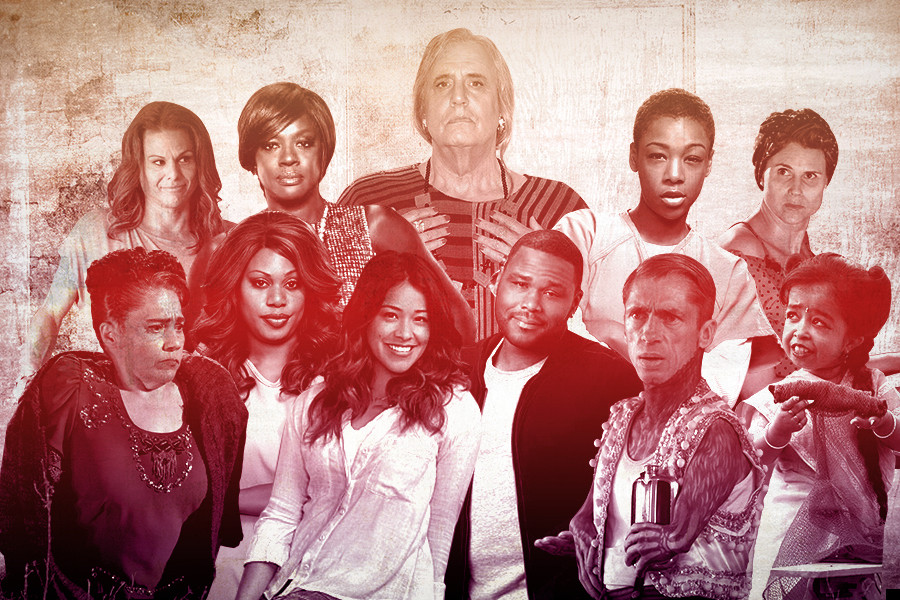
When television historians (and future listicle makers) look back on 2014, one thing will seem crystal clear: this past year was one of the most diverse in the history of the small screen, a transformative revolution that showcased a wide array of identities, bodies and sexualities. For the first time ever, more audiences could look at their favorite shows and see characters, actors and lifestyles that more closely reflected themselves.
Just look at the new shows. ABC’s “Black-ish” is not only the first all-black comedy on a major network in five years — the last was Fox’s “Brothers,” which ran for one season in 2009 — but also a smart and funny sitcom that addresses race in modern suburban America. Willa Paskin of Slate called it the “best new sitcom of the fall,” while our TV critic Maureen Ryan reminded us why a show like “Black-ish” is necessary now more than ever.
Mexican-American stand-up comedian Cristela Alonzo also made history this year, becoming the first Latina to create, produce, write and star in her own sitcom. The CW’s “Jane the Virgin,” an hour-long comedy that pays humorous tribute to telenovelas, introduced audiences to star Gina Rodriguez.
“The fact we got recognized and that I’m the first person to get recognized from The CW and I’m a Latina, I would be empowered by that … I am empowered by that,” Rodriguez told BuzzFeed after her recent Golden Globe nomination. “Because if I can do it, that means there are so many other people who are going to be able to do it. It’s that idea that when you make your dreams come true you allow other people to dream and try to make their dreams come true. That’s all I did, I opened the floodgates. Now everybody can see that if I can do it, what makes you any different? This little lady from Chicago in the little-engine-that-could show on the smaller network? It’s not where you’re from, it’s where you’re going, and we’re trying to go where everybody else is at and it feels like we just arrived there.”
Old shows sparkled too. Netflix’s “Orange Is the New Black” continued to lead a progressive movement on television and even found time to celebrate women of different body types.
And a conversation about the growing diversification of the television industry wouldn’t be complete without praise of Shonda Rhimes, queen of Thursday night. Rhimes is not only a powerhouse figure on her own, being one of the few women, and women of color, behind the camera, but she’s also brought us two hit shows led by black actresses. With “Scandal,” Kerry Washington became the second African-American female to lead a network drama since Diahann Carroll starred in 1968’s “Julia,” and “How To Get Away With Murder” not only stars Viola Davis, but also features a racially diverse cast of young actors.
Said Rhimes during a speech earlier this month: “This moment right here, me standing up here all brown with my boobs and my Thursday night of network television full of women of color, competitive women, strong women, women who own their bodies and whose lives revolve around their work instead of their men, women who are big dogs, that could only be happening right now.”
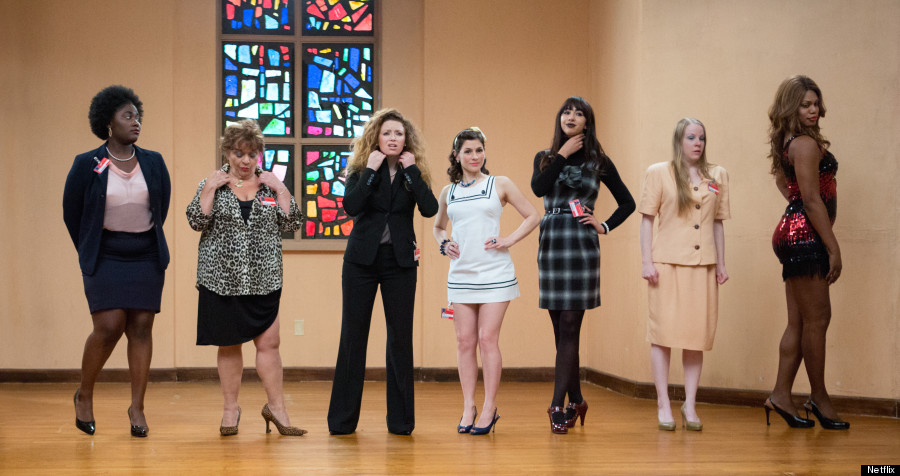
But adding people of color to television was just one layer exhibited, explored and celebrated this year. Both new and returning shows have featured main characters and actors of a variety of sexual orientations, gender identities and bodies. Amazon’s “Transparent” gave us a show about a transgender matriarch of a Jewish family, which included two daughters confronting with issues of gender identity and sexuality. The series also features a handful of transgender actors and crew members, and writer-creator Jill Soloway recently hired the show’s first trans writer. MTV’s “Faking It” proved groundbreaking when it introduced an Intersex character to television along with an illuminating video about what it means to be born Intersex, while the network also aired Laverne Cox’s “The T Word” documentary about trans youth. Both HBO’s “Looking” and Ryan Murphy’s “The Normal Heart” told stories about relationships and real-life hardships within the gay community. “Modern Family” ended its latest season with a gay wedding while real-life same-sex marriages were officiated live during the Grammy Awards. Cox, who first became a household name thanks to “OITNB,” was the first openly transgender person to appear on the cover of Time magazine and to be nominated for an Emmy. And Murphy pushed things even further with his “American Horror Story: Freak Show,” which features a cast of actors with disabilities, or as FX has called their “extra-ordinary artists,” in a way no show has done before.
And yet while a quick scan across television networks (and on Internet streaming platforms) proves that American television has made profound progress over the past 12 months, it’s also important to recognize that no peak has been reached. One important conversation about the representation of marginalized communities on television is not just about what types of diverse stories are being told, but who is being cast in those roles. Two specific communities that are on the cusp of this change are the transgender and queer communities and actors with disabilities. People who identify with these groups have been a part of a giant cultural shift this year thanks to “Transparent” and “AHS: Freak Show,” but we’re still only in the preliminary stages of allowing television to mirror the audiences who watch it.
“I wish we didn’t have to think it was radical to cast disabled actors in a drama. Casting directors should stop being so scared and bite the bullet.”
Alexandra Billings, who plays Maura’s transgender friend Davina on “Transparent,” spoke to HuffPost Entertainment about the increased visibility of her transgender community on television this year and how the show has helped initiate it. “The fact that a transgender [woman] is the center of a family comedy-drama is groundbreaking,” Billings told us. She agreed that Jill Soloway’s series was a part of a major movement away from negative and superficial portrayals of trans characters that have previously been seen on television. When reflecting on her career, Billings said how tired she was of playing the same trans character, which for some reason always revolved around hospitals. Considering the history of transgender characters on TV, Billings said that one significant step forward that’s been made is having more authentic portrayals of trans people. “You can’t put a man in a dress and call them transgender in television anymore,” Billings said. “I remember a time when you had to do that and we were the butt of the joke.”
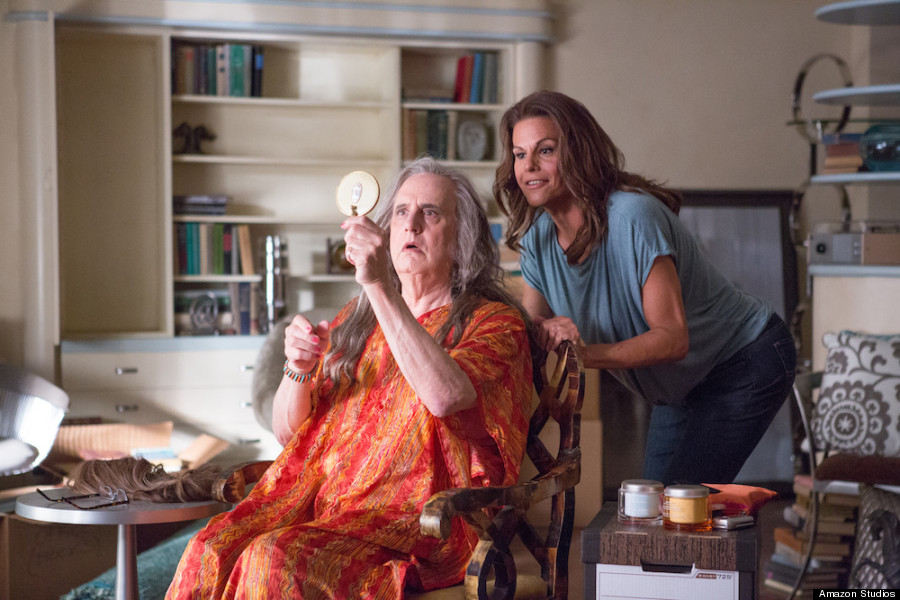
Another transgender actress further diversifying TV this year is Erika Ervin of “AHS: Freak Show.” Ervin is one of the first trans actresses to play a cisgender character on a show (she stars as Amazon Eve, a seven-foot-tall woman who is part of Elsa Mars’ “freak show”).
“It feels validating,” Ervin told HuffPost Entertainment about Amazon Eve, a character that she developed years before and brought to “AHS” once cast. “Not only from a political standpoint. Transgender people are out there, we’re making our way.” Yet while Murphy’s anthology series and “Transparent” are helping move TV forward in terms of LGBT characters, there is still a long way to go. Ervin noted that while things are definitely changing, we still must ask, “Is it really progress?”
“You can’t put a man in a dress and call them transgender in TV anymore. I remember a time when you had to do that and we were the butt of the joke.”
One heavily debated topic about LGBT representation is the casting of cisgender actors, or people who identify with the gender they were assigned at birth, in transgender roles. While an on-going argument, it became most relevant this year when Jared Leto won the Oscar for portraying a trans woman in “Dallas Buyers Club.” “Transparent” also received criticism for casting Tambor as Maura, with some even calling the show “transphobic” for the decision. Trans writer Kat Hache recently wrote about the controversy surrounding Arcade Fire’s “We Exist” music video, which stars Andrew Garfield as a character who appeared to be trans — though it should be noted that Our Lady J, who worked with Garfield on the video, has said he was playing a “young man exploring his gender.” Hache wrote, “There seems to be a prevalent idea in Hollywood that viable transgender actors and actresses simply do not exist.” Besides a prolonged invisibility of real-life trans people on screen, another major issue this highlights is the growing unemployment for trans actors, which Laverne Cox has said is “twice the national average” and “four times” for trans actors of color.
Yet Billings had a bit of a different perspective on the contentious debate. “The only reason the argument is futile right now is because we need help in order to get through the door,” she told us. Billings urges cis actors to be “mindful” and “aware” of their portrayals of trans people’s journeys, while also grateful for them. Ideally though, she believes that the only way to fully represent the stories and lives of her community is through casting those who identify with it. “This word authenticity is thrown around a lot. We need to really understand what this thing means. I think instead of having authentic representations what we need to have are true representations. And really, the only way to do that is to hire us.”
While this year has given way to an increased visibility of people with disabilities on TV as well, it’s only the first waves of change. HuffPost caught up with Mat Fraser, who plays Paul the Illustrated Seal on “AHS: Freak Show” on his last day filming the series. The British actor has been performing on the stage and screen for 20 years and acknowledges that small advancements have been made in regard to casting actors with disabilities. Fraser cited the BBC’s recent initiatives to cast more actors with disabilities in TV series. But even though Fraser recognizes how groundbreaking “AHS” is this season in casting him, along with Rose Siggins, Jyoti Amge and Ben Woolf, among others, he knows it’s only the beginning.
“I wish we didn’t have to think it was radical to cast disabled actors in a drama,” Fraser said after mentioning how progressive Murphy’s casting decisions have been. “The irony’s not lost on me that the first time I’ve given an opportunity to show my universal humanity as an actor is by playing a freak in a freak show. I wonder if casting directors and producers will be able to see that I’m, and as are all competent disabled actors, capable of showing that universal humanity that is the stuff of drama.”
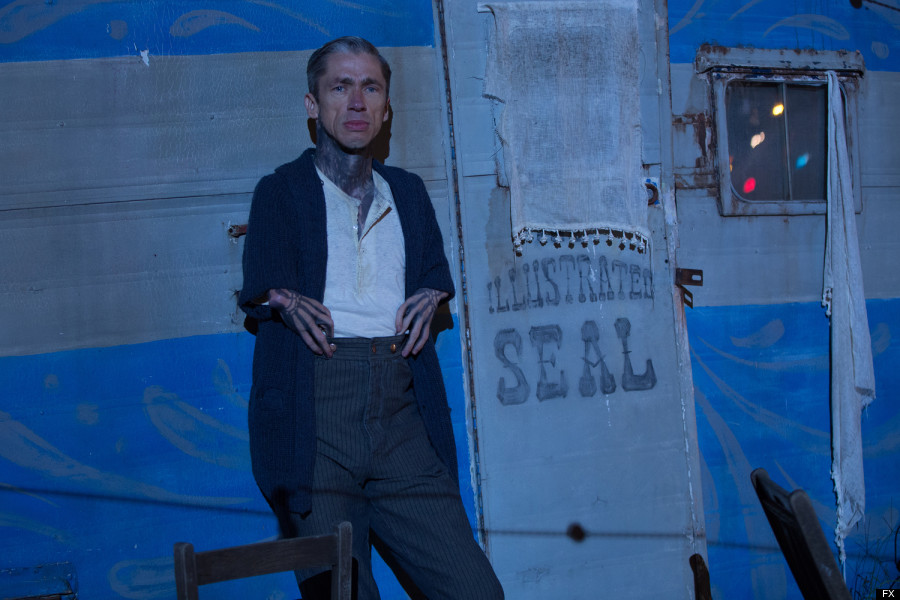
While Fraser didn’t hesitate to share how much he appreciates and loves playing Paul in “AHS,” he also hopes for a future where he won’t just be playing a disabled character. “The actors should be allowed to just act,” Fraser said. “Casting directors should stop being so scared and bite the bullet and cast us. I just want to do normal, well-written drama like everybody else.”
Fraser brought up that the huge fan attention he’s received from the show — besides an increase in Twitter followers, Fraser says he has also gotten “romantic texts” from teenage “emo girls” — evinces just how much viewers are ready to embrace him as a talented actor outside of his physical condition. “I got portrayed as a lover by Ryan, so people now relate to my character as a lover character and imprint that romance interest on to [him],” Fraser said. “All you have to do is tell people this is the guy [who’s] the romantic one and four thousand people relate to you in that way. That’s the power of television and drama. That should be proof that you can cast us anywhere.”
While 2014 has been a monumental year for more accurate representation of diversity, it has also been a year for igniting significant discussions. But television networks and producers are just barely scratching the surface off our beautifully diverse world. And with the very first leaps of change will come the deepening cracks of true progression.
Billings said that from her experience in the trans community, once someone begins their transition or a “transition into any kind of newness, the circle of people around you are forced to go with you.” Now that the beginning molds of diverse storytelling and casting have been broken on television, we can hope that a larger movement will follow, with the rippling effects of 2014 finally becoming actualized in years to come.
HRC Board Member Recognized as “Fearless LGBT Advocate” in Arizona
HRC Board Member Recognized as “Fearless LGBT Advocate” in Arizona

Sheila Kloefkorn, a member of HRC’s Board of Directors and Tempe resident, was named as an Arizonan to watch by The Arizona Republic.
HRC.org
Keep Your Nipples Unclamped! Newly-Released Documents Reveal Maggie Thatcher Wanted To Ban Sex Toys
Keep Your Nipples Unclamped! Newly-Released Documents Reveal Maggie Thatcher Wanted To Ban Sex Toys
 We always knew Margaret Thatcher was a prude, but we had no idea she was this puritanical.
We always knew Margaret Thatcher was a prude, but we had no idea she was this puritanical.
A trove of new documents released by the National Archives in the U.K. have unveiled that the Iron Lady once considered a law banning sex toys (i.e. dildos, butt plugs, nipple clamps, etc.) in an effort to promote “public decency” and prevent “physical injury.”
The documents reveal the former prime minister was persuaded to consider the law by notorious antifeminist, antigay, anti-television, anti-obscenity, anti-everything campaigner Mary Whitehouse.
Thatcher’s home secretary, Lord Leon Brittan, wrote to his boss in September 1986 about Whitehouse’s “strong case” for banning sex toys under the 1959 Obscene Publications Act, the same law used to prosecute the publisher of DH Lawrence’s classic romance novel Lady Chatterley’s Lover.
Brittan explained: “Some of the items in circulation are most objectionable, including some which can cause physical injury.”
He went on to say that he believed that sex toys could be deemed “deprave and corrupt.”
In response, Thatcher requested Brittan prepare a test which would allow lawmakers to set a new bar for measuring what was indecent. After mulling it over for a bit, Brittan replied that trying to measure that sort of thing would be too complex a concept for the courts to litigate over and the plan was swiftly abandoned.
The news of Mrs. Thatcher’s war on sex toys comes mere weeks after the U.K. government imposed a new law banning certain sex acts in British-made adult videos, including spanking, facesitting, and caning, among other things. Lawmakers deemed the acts morally corrupt and dangerous, sparking outrage among many who accused the government of attempting to police their bedroom behavior and impose upon their civil liberties.
Related stories:
Hey Brits, You Can Perform And Watch These Sexual Activities, Just Don’t Film Them
How The UK Ruined Gay Sex For Everyone
Graham Gremore is a columnist and contributor for Queerty and Life of the Law. Follow him on Facebook and Twitter.
Graham Gremore
Conservative Group Sues to Block Marriage Equality from Taking Effect in Florida Next Week
Conservative Group Sues to Block Marriage Equality from Taking Effect in Florida Next Week
Florida Family Action, Inc, a conservative group led by anti-gay wingnut John Stemberger (above), filed lawsuits on Tuesday seeking to stop marriage equality from going into effect on January 6 when a stay of U.S. District Judge Robert Hinkle’s ruling striking down the state’s gay marriage ban expires, the AP reports:
The officials named in the lawsuits are Osceola County Clerk of Court Armando Ramirez, Orlando Mayor Buddy Dyer (pictured, right) and Circuit Judge Robert LeBlanc.
The conservative group argued the lifting of the state’s ban on same-sex marriage applies to only Washington County in the Panhandle, where the legal challenge originated.
Ramirez is the only Florida clerk of courts outside of Washington County who has publicly said he will issue licenses to same-sex couples, according to a survey of clerk of courts done by The Associated Press last week.
Dyer and LeBlanc have said they plan to officiate at same-sex weddings on Jan. 6, the day Florida’s ban on gay marriage is scheduled to be lifted.
Said Stemberger of the suits:
“All three of these officials have shown great contempt and disrespect for the rule of law and are behaving irresponsibly and unprofessionally. The federal court decision is clear that it only applies narrowly to the two plaintiffs and only in Washington County. Elected officials must be held accountable to the law and to the constitution they have sworn to uphold. Part of the reason for the recent landslide mid-term election was the utter disregard and insolence shown by President Obama for the rule of law which is now infecting so many other politicians across America. Respect for law must be restored or else legitimacy in government as an institution will diminish at an even greater rate. Ultimately, if these local officials continue in this same reckless pattern of behavior, they could easily face the same fate as so many other politicians did who are now retired as a result of the last election.”
Stemberger said in July that the fight against same-sex marriage is “worth dying for.”
Florida Attorney General Pam Bondi asked Hinkle late on Monday to clarify the scope of his ruling, asking him to specify whether it applies to clerks throughout the state. A majority of the 67 county clerks in Florida have said they will not issue marriage licenses to gay couples unless it is clarified.
Florida Family Action also filed a brief in the case arguing that the judge cannot expand the scope of his ruling to include any other clerk in the state.
#106 on Scribd”>4:14-cv-00107 #106 by Equality Case Files
Andy Towle
item_1.adapt.480.high.1419544493945

The 6 Resolutions All Gay Men Should Make
The 6 Resolutions All Gay Men Should Make
Break out the bubbly and light up the sparklers, because it’s time to ring in the New Year.
Tyler Curry
www.advocate.com/commentary/tyler-curry/2014/12/30/6-resolutions-all-gay-men-should-make

